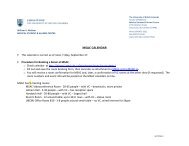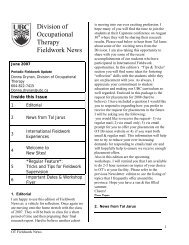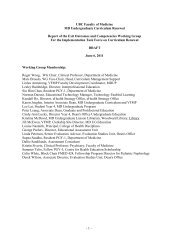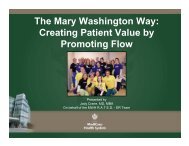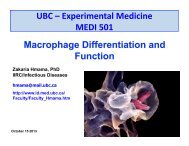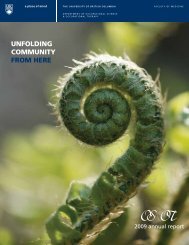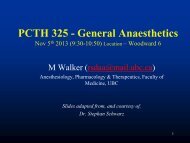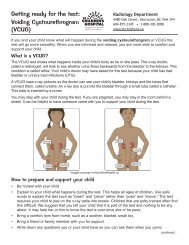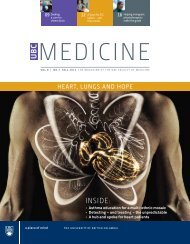MEDICINE
download a copy - University of British Columbia Faculty of Medicine
download a copy - University of British Columbia Faculty of Medicine
- No tags were found...
You also want an ePaper? Increase the reach of your titles
YUMPU automatically turns print PDFs into web optimized ePapers that Google loves.
L – R: Railroad entrepreneur Willard<br />
Kitchen, surrounded by colleagues;<br />
Judith Jardine, his granddaughter.<br />
An unrestricted gift, from an uNExPECtED sourCE<br />
Fewer UBC medical students will struggle financially and more<br />
UBC medical researchers will be able to pursue cutting-edge<br />
ideas, thanks to a $7.4 million bequest – the largest estate gift<br />
to the Faculty of Medicine in its 63-year history, and the largest<br />
unrestricted donation to the Faculty for students or research.<br />
Judith Jardine, who died in 2006 at the age of 81, was the sole heir<br />
to the wealth of the Kitchen/Jardine families of Vancouver. Through<br />
her will, she left part of her estate to the Faculty of Medicine.<br />
“We are extremely grateful to Ms. Jardine for supporting medical<br />
education and research at UBC,” says Gavin Stuart, Dean of<br />
the Faculty of Medicine and UBC’s Vice Provost, Health. “Her<br />
generosity will make an indelible difference in the lives of<br />
British Columbians through the training of future doctors and<br />
advancement of life-saving research.”<br />
The funds received by the Faculty will establish the Willard<br />
Kitchen Memorial Fund, named for Jardine’s maternal grandfather,<br />
who amassed his fortune building railways in New Brunswick.<br />
After moving with his family to Vancouver, Kitchen became a director<br />
of the Pacific Great Eastern Railway, which later became BC Rail.<br />
Although Ms. Jardine had no obvious connection to UBC’s medical<br />
school, she was a triple alumnus of the university, earning a B.A.<br />
and M.A. in French, and a Bachelor of Library Science.<br />
The discretionary nature of the gift is particularly useful for the<br />
Faculty’s research agenda, because it can support the kind of<br />
cutting-edge investigations that are often deemed too risky for<br />
funding agencies.<br />
A portion of the bequest will be used to support research in the<br />
Faculty of Medicine’s three priority areas – neuroscience and<br />
mental health, heart and lung, and cancer.<br />
A pioneer determined to support others’ research<br />
Jean Templeton Hugill always cut a<br />
distinctive figure, not only for her bright<br />
lipstick, colourful wardrobe and love of<br />
cocker spaniels, but for her occupation –<br />
an anesthesiologist in 1950s Vancouver,<br />
a time and place when the field was<br />
overwhelmingly male.<br />
As one of the first female anesthesiologists<br />
Jean Templeton Hugill.<br />
in western Canada, Dr. Hugill earned a<br />
reputation for taking on difficult cases, becoming a key figure in<br />
developing obstetrical anesthesiology in British Columbia.<br />
“To be a leader in anesthesia as a woman in those times was<br />
very tough,” says Bernard MacLeod, Associate Professor in the<br />
Department of Anesthesiology, Pharmacology and Therapeutics,<br />
who trained under Dr. Hugill. “She wanted to do basic research,<br />
but never had the opportunity.”<br />
After a career devoted to improving anesthesiology from the bedside,<br />
Dr. Hugill was determined to support the research of others. Upon<br />
her death in 2012, Dr. Hugill left a $562,500 bequest to the Faculty<br />
of Medicine, adding to the $500,000 gift she made in 1991 that was<br />
matched by the province to establish an endowed chair.<br />
Dr. MacLeod, the current Dr. jean Templeton Hugill Chair in<br />
Anaesthesia, and his predecessor, Ernest Puil, contributed to<br />
several research findings that have had a direct impact on patients<br />
undergoing anesthesia. Dr. Puil collaborated with engineers to<br />
develop a method of monitoring the depth of anesthesia, which is<br />
now in clinical use in France. Dr. MacLeod is helping to develop the<br />
pain-relieving properties of a novel amino acid found in meteorites<br />
from Mars.<br />
A donor himself, Dr. MacLeod lowered his stipend and makes<br />
annual donations so the Hugill endowments can support more<br />
graduate students.<br />
“Dr. Hugill put forth a mission to the Department to draw<br />
together anesthesiologists, pharmacologists and engineers<br />
to do translational research, which they did and still do,” says<br />
Roanne Preston, the Head of the Department. “Through her<br />
philanthropy, Dr. Hugill is ensuring that her vision for progress<br />
in the field continues.”<br />
In more ways than one: Today, nearly half of UBC’s anesthesiology<br />
residents are women.<br />
To support anesthesiology research, please contact Laura Ralph<br />
at 604.827.4728.



